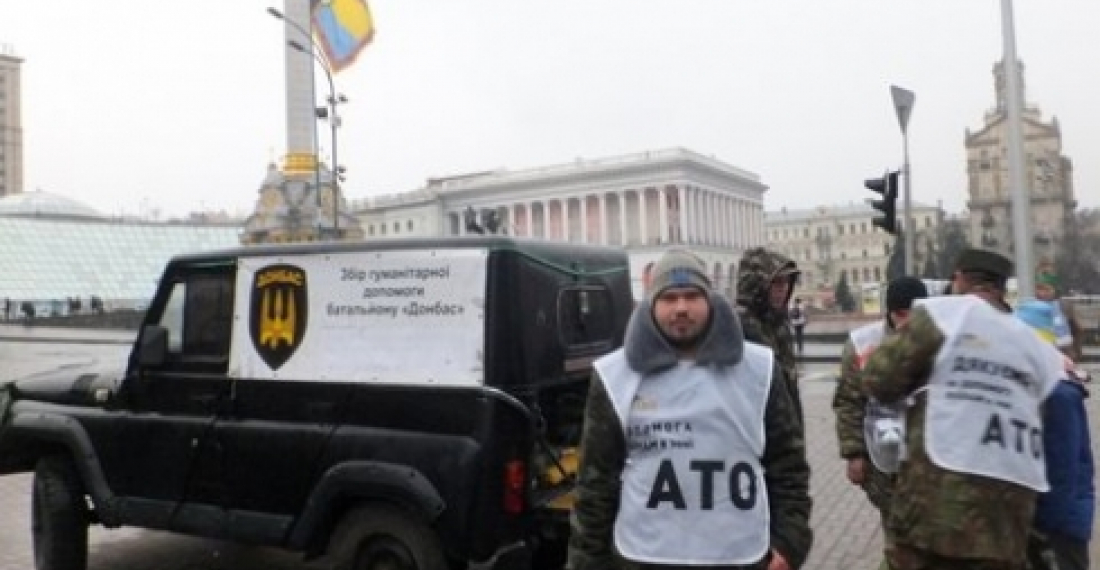One year after the historic events on Kiev's Maidan Square the city remains gripped in political drama. Whilst the shooting in Ukraine's capital has stopped, the echoes of the conflict in the east of the country resonate in different ways.
Our special correspondent Joseph d'Urso was in Kiev last week and he sent in this photo-essay for commonspace.eu.
♦ Every stall, scrap of fence, streetside entertainer - everything in Kiev is political at the moment. Everything, everywhere makes some reference to the guns rumbling in Ukraine's east.
Even the small currency booths, ubiquitous in every eastern European city, tell a story. When I arrive on February 22nd one US dollar is worth 28 hyrvnia. Two days later it is 33. Then it falls again. The old women who run the exchanges begin to add their own zeroes in pen.
♦ Pensions denominated in Ukrainian currency are becoming increasingly worthless, while young people's dreams to travel abroad are becoming increasingly improbable. Paul, dressed as a tiger, and a panda bear who would rather not share his name, earn money having their photos taken with tourists.
They do not seem very busy this February. "Lots of people died here. We see many people crying. But we can make them smile. F*** Putin!" says Paul.
♦ People did die, last year, on the patch of concrete behind the tiger and panda. One hundred protestors were gunned down a year ago by government forces attempting to break up the 'Euromaidan' protests. President Yanukovich was removed from office shortly after, with new elections held in May.
The ghosts of the 'heavenly hundred' still haunt Kiev. Along the street where sniper fire rang out lie flowers, lanterns and pictures of the dead. Their birth dates span the decades, but their death dates all read February 2014. Many were teenagers.
♦ It is a far cry from the summer of 2012, when tourists occupied the city for the European Championships. Kievans still speak fondly of the Swedish contingent who camped for weeks in the woods on the left bank of the Dnieper river. Lyudmila, a tour guide, shows a picture of her with James Milner and Phil Jagielka, two English footballers, outside one of Kiev's main cathedrals that summer. "I used to get thirty people on tours," she says. "Now I'm lucky to get one or two.
"Last week, trudging through snow to the stadium where England were knocked out of the tournament by Italy in 2012, beach parties felt a world away. FC Dynamo Kiev were playing Guingamp, a French side, in the knockout stages of the Europa League. When Dynamo came from behind, a second goal hitting the net, the ‘ultras' section of the crowd drew attention away from the pitch as eyes swivelled to a remarkable spectacle: thousands of topless men jumping up and down in the sleet.
Play was suspended for ten minutes as fans ran on the pitch to charge at the few dozen brave souls who had made the journey from France. Ultimately the Ukrainian side won. Fans piled onto the metro after the final whistle chanting Glory to Ukraine! Glory to heroes!, and a ruder song about Vladimir Putin. Dynamo are facing England's Everton FC in the next round. Phil Jagielka will return to Kiev.
In the crowd, the ubiquitous blue and white of Dynamo was heavily peppered with the gold and blue of the Ukrainian flag. On occasion the red and black of a more muscular Ukrainian nationalism could be seen: the flag of the Ukrainian Insurgent Army which fought the Soviets in the Second World War.
♦ In the current political situation, red and black represents the Right Sector, a far-right party who did badly in last May's parliamentary elections, but have been organising volunteer fighters to battle separatists in the east. The controversial group seem a normalised feature of life in Kiev, openly raising money in the Maidan. A demonstration outside the National Bank of Ukraine, with a crowd demanding the resignation of Valeriya Hontareva, the bank's chair, sees more red and black than blue and yellow.

♦ The insignia of the Azov Battalion, bearing some resemblance to a swastika, can be seen on posters and graffiti.
♦ More common, however, are men like Ruslan, standing beneath the gold and blue national flag of Ukraine and raising funds for the 'ATO' (the Ukrainian army refers to the operation in the east of the country as an 'Anti-Terrorist Operation'). If you walk onto the Maidan now, an ATO man will doubtless shake his bucket at you.
♦ To some extent, life goes on as normal. At the spectacular Pechersk Lavra, pilgrims and monks mingle, and people venerate the dead saints in their caskets by candlelight underground. But there are few tourists, and certainly no English footballers.
♦ However outside St Michael's, another spectacular monastery in the centre of Kiev, there are burnt out vehicles and shell casings. This equipment, with its Russian serial numbers, is on display as 'evidence of the Russian military aggression on the territory of Ukraine'. In Kiev at the moment, any distraction from war can only be temporary.
source: Photo-essay by Joseph d'Urso for commonspace.eu
(c) commonspace.eu







